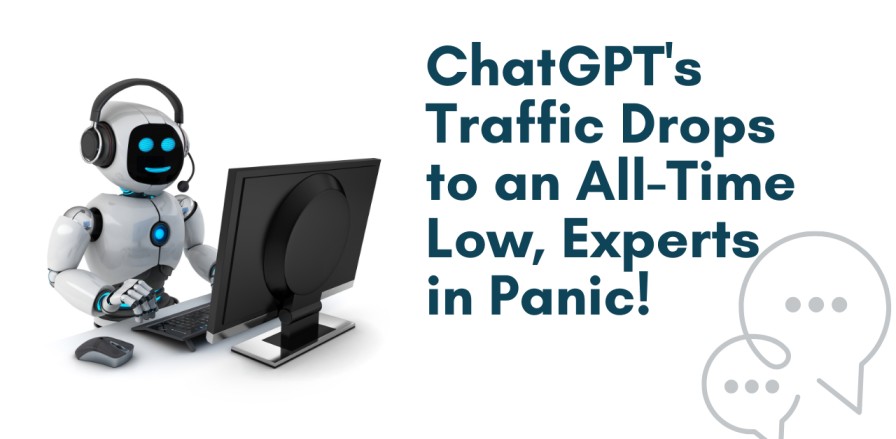The artificial intelligence community has been buzzing with excitement since OpenAI’s release of ChatGPT, an advanced language model. With its remarkable ability to understand and generate human-like text, ChatGPT quickly gained popularity and became a valuable tool for various applications.
However, recent data suggests that this revolutionary AI has experienced a decline in traffic for the first time since its launch based on analytics company Similarweb. We’ll look into what caused this decline and discuss what it means in this piece.
I. Understanding ChatGPT’s Initial Success
ChatGPT’s rise to fame can be attributed to several key factors. From the outset, it captured the attention of professionals and enthusiasts alike due to its unprecedented ability to carry out coherent and contextually relevant conversations. Its intuitive interface and user-friendly design made it accessible to many users, further fueling its rapid growth.
The AI community embraced ChatGPT with open arms, recognizing its potential as a powerful tool for content generation, customer support, and creative writing. The model’s versatility allowed it to cater to various industries, providing tailored solutions to meet specific needs. As a result, an enthusiastic user base eager to discover the possibilities of this ground-breaking technology fueled the initial surge in traffic.
II. Factors Contributing to the Decline in Traffic
Despite its initial success, ChatGPT recently experienced a decline in its user traffic. Several factors can be attributed to this shift:
a. Limitations and Inaccuracies
One of the primary challenges faced by ChatGPT is the inherent limitations of the language model. While it excels at generating coherent and contextually relevant text, it is not immune to errors or inaccuracies. Users encountered situations where the AI failed to understand complex queries or produced misleading responses. These limitations have led to frustration and a loss of trust among some users, contributing to the decline in traffic.
b. Competition and Alternatives
As the field of AI advances, competitors and alternative solutions emerge. Several companies have introduced their own language models, offering similar functionalities to ChatGPT. This increased competition has divided the user base, leading to a dilution of ChatGPT’s market share. With additional options available to users, ChatGPT is seeing less traffic overall.
c. Privacy and Ethical Concerns
The use of AI models raises valid concerns regarding privacy and ethical considerations. As ChatGPT became more popular, concerns about data security and the responsible use of AI started to surface. Some users expressed reservations about sharing sensitive information with an AI-powered platform. These concerns have influenced user behavior and contributed to the decline in traffic as users seek alternatives that prioritize privacy and ethical practices.
III. Navigating the Future: Overcoming Challenges and Ensuring Growth
While ChatGPT faces challenges, it is important to recognize that setbacks are a natural part of any innovation journey. OpenAI, the organization behind ChatGPT, has proactively addressed user concerns and improved the model. They can regain user trust and reignite growth by actively seeking user feedback and implementing necessary enhancements. Key strategies to navigate the future include:
a. Continuous Improvement
OpenAI should prioritize continuous improvement by investing in research and development. By addressing the limitations and inaccuracies of ChatGPT, the model can be refined to deliver even better results. OpenAI should also work on expanding the AI’s knowledge base, ensuring it remains up-to-date and relevant to users across various industries. This ongoing commitment to improvement will help restore user confidence and attract new users to the platform.
b. Enhancing User Experience
OpenAI should focus on enhancing the user experience to address the competition and retain users. An intuitive, user-friendly interface that enables fluid interactions can achieve this. Incorporating user preferences and customization options can make ChatGPT more adaptable to individual needs, increasing user satisfaction and loyalty.
c. Transparency and Ethical Practices
OpenAI should prioritize transparency and ethical practices to alleviate privacy and moral concerns. Communicating data usage policies, ensuring user data security, and providing options for anonymized interactions can help rebuild trust among users. OpenAI should also actively engage with the AI community and regulatory bodies to establish industry standards and guidelines for responsible AI usage.
d. Diversifying Applications
Expanding the applications of ChatGPT can reinvigorate its growth. OpenAI should explore partnerships with different industries to showcase the versatility and value of the AI model. ChatGPT can tap into new markets and attract a broader user base by demonstrating its effectiveness in healthcare, education, and customer support.
IV. Conclusion: Embracing the Evolution
The decline in traffic for ChatGPT is a crucial turning point in its evolutionary journey. It serves as a reminder that no technology is immune to challenges and setbacks. However, with OpenAI’s dedication to improvement, user-centric enhancements, transparency, and diversification, ChatGPT can overcome these obstacles and remain at the forefront of AI innovation.
As users, it is important to recognize the potential of AI models like ChatGPT while being aware of their limitations. We can contribute to developing more reliable and efficient AI systems by providing constructive feedback. Together, we can shape the future of AI and unlock its transformative power responsibly and beneficially.
“The true sign of intelligence is not knowledge but imagination.” – Albert Einstein
Remember, the decline in traffic is just a bump on the road to progress. With continuous innovation and user-centric improvements, ChatGPT has the potential to regain momentum and redefine how we interact with AI-powered technologies.







